 Lance Charnes and I are Goodreads friends, having “met” (electronically) a few years ago through the Action Heroine Fans group. Some time ago, I bought a copy of his outstanding debut novel, Doha 12, and it got five stars from me. This new novel, the opener for a projected series, didn’t come to me as an official review copy –instead, Lance generously donated a print copy to the library where I work– but he knew I would read and review it, and knew my tastes well enough to be pretty sure I’d like it. Of course, we both understood that he might be wrong –but he wasn’t! For much of my reading experience, I expected to rate the book four stars –a denouement and conclusion that blew me to pieces and then knit me back together easily pushed it up to five stars.
Lance Charnes and I are Goodreads friends, having “met” (electronically) a few years ago through the Action Heroine Fans group. Some time ago, I bought a copy of his outstanding debut novel, Doha 12, and it got five stars from me. This new novel, the opener for a projected series, didn’t come to me as an official review copy –instead, Lance generously donated a print copy to the library where I work– but he knew I would read and review it, and knew my tastes well enough to be pretty sure I’d like it. Of course, we both understood that he might be wrong –but he wasn’t! For much of my reading experience, I expected to rate the book four stars –a denouement and conclusion that blew me to pieces and then knit me back together easily pushed it up to five stars.
Being his Goodreads friend, I try to keep abreast of Lance’s book reviews, so I know firsthand how well read he is in the whole area of the contemporary fine arts market, and particularly of its increasingly seedy underbelly. In real life, art by big-name artists can command staggering prices, and in the last 15-20 years it’s come to be a major commodity in the world of big-time international money laundering and shady commercial exchanges where cash transfers come too easily to the attention of authorities. And a lot of art that’s traded this way may be stolen, or forged.
Rich collectors with an enthusiasm for art aren’t the only players any more; we’re dealing with crime syndicates, corrupt and despotic governments and their officials, and billionaires looking for ways to cheat the tax authorities, and violence and murder may be aspects of normal business operations for some of these people. Lance sets this novel in that milieu, and he and his protagonist Matt Friedrich know it like the back of their hand. The author is also well-traveled; he sets his tale mostly in Europe, and principally Milan, and brings the locale to life with an assurance and level of detail which suggests he’s actually been there, or researched it a LOT online.
This is crime fiction more than traditional mystery; and as in his debut novel, Lance uses the knowledge of skulduggery, weapons, and high-technology snooping gained as a military intelligence officer to good advantage. The plotting is taut (first-person, present-tense narration is used for maximum immediacy) and the pace brisk, with a steady dose of dangerous situations and life-threatening tension. Matt’s crafty scheming sometimes takes the reader by surprise, and he’s sometime majorly taken for surprise himself, along with the reader. Action scenes aren’t frequent, but you never know when they could erupt, and when they do they’re well depicted. I’ve used the term “thriller” for this book, and that’s one I seldom use; I don’t seek out books that bill themselves that way, because I think the plotting is usually so cliched and stereotyped that it fails to thrill. This one doesn’t fail.
I’ve also used the term “gritty.” As described above, the moral world of this novel is a dark one where people are generally guided by the most selfish and cynical of motives, where the law is typically powerless to do much, and where innocent people are hurt as a by-product of what some of the characters routinely do. The DeWitt so-called “Agency” is a morally ambiguous enterprise that works for the highest bidder, and our narrator is an ex-con who was once involved in crooked art deals, and is now so crushed under a mountain of legal debts that he’s willing to violate his parole by working for said agency if it gives him a shot at paying it down.
And yet this is a surprisingly (or perhaps not surprisingly, given the moral vision that animates the author’s earlier novel) moral work of fiction, with a main character who’s learned something about life and ethics from his time in prison, and who wants to become a human being that he can look in the mirror and respect. He’s going to encounter challenges and decisions here that will put that resolve to the test. Both Matt and Carson (the female operative he’s paired with –who provides the team’s muscles and fighting skill when it’s needed) are intensely vital, round, realistic characters with a credible pattern of interactions that doesn’t stay static, but develops believably. Unlike some writers of this type of fiction, Lance understands that characters you care about are the only thing that can truly provide it with its heart, and he gives character development and relationships their due. There’s a lot that I can’t tell you because I’m determined to avoid spoilers; but I can say that this is where the book really earns its stars. (The principal supporting characters are masterfully drawn as well.)
You don’t have to be familiar with the world of the contemporary art market to enjoy this book (I’m not, at all); the author explains everything you have to know, and he does it easily and smoothly, in small doses with no info-dumps. None of the discussion is detailed enough to be boring. He uses enough physical description to let you visualize scenes, but not, IMO, too much; the same with technological exposition. (At one point, I didn’t really understand what one of the villains was trying to gain by his conduct; but the narrative drive carried me through without asking questions.) f you’re any kind of fan of crime fiction thrillers in a contemporary setting, and my review intrigues you rather than turning you away, I’d say this is definitely worth your checking out. I’m certainly going to be following the series; and I’m now even more anxious to read the author’s South, sooner rather than later!
Matt’s very sensible to feminine charms (he hasn’t been out of prison very long), but there’s no sex here, and Matt actually refrains from taking sexual advantage of one young woman. Violence isn’t any more frequent or graphic than it needs to be. As for bad language, not all of the characters swear, but some do, including Matt; Carson and one of the villains have the worst mouths (including the f-word as regular vocabulary). I never felt that the author was trying to mainstream that kind of thing, nor push the envelope with it.
Author: Lance Charnes
Publisher: Wombat Group Media, available through Amazon, both for Kindle and as a printed book.
A version of this review previously appeared on Goodreads.
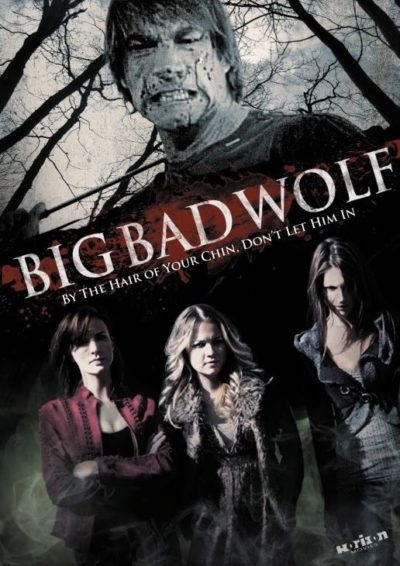 A modern-day update of The Three Little Pigs, this works better than you might think. The wolf is “Huff” (O’Connell), a really warped individual whose interests appear to be religion, drugs and molesting his three step-daughters. Bit of an odd combination. Their mother, Lorelei (Elina Madison), is a largely absent stripper, who seems not to care too much that her boyfriend’s attention have now turned from her oldest daughter, Brixi (Bollinger), to the youngest one, Shay (Stefanko). But when Huff prepares his big score, using cash “borrowed” from his mistress’s ex-husband (or something like that – the relationships here are so complicated, you need a chart to keep track), Lorelei sees her opportunity, sending the three girls away with the money. That leaves Huff in serious trouble, and he’s soon after them, intent on retrieving the cash. Huff is indeed going to puff… on his asthma inhaler.
A modern-day update of The Three Little Pigs, this works better than you might think. The wolf is “Huff” (O’Connell), a really warped individual whose interests appear to be religion, drugs and molesting his three step-daughters. Bit of an odd combination. Their mother, Lorelei (Elina Madison), is a largely absent stripper, who seems not to care too much that her boyfriend’s attention have now turned from her oldest daughter, Brixi (Bollinger), to the youngest one, Shay (Stefanko). But when Huff prepares his big score, using cash “borrowed” from his mistress’s ex-husband (or something like that – the relationships here are so complicated, you need a chart to keep track), Lorelei sees her opportunity, sending the three girls away with the money. That leaves Huff in serious trouble, and he’s soon after them, intent on retrieving the cash. Huff is indeed going to puff… on his asthma inhaler.




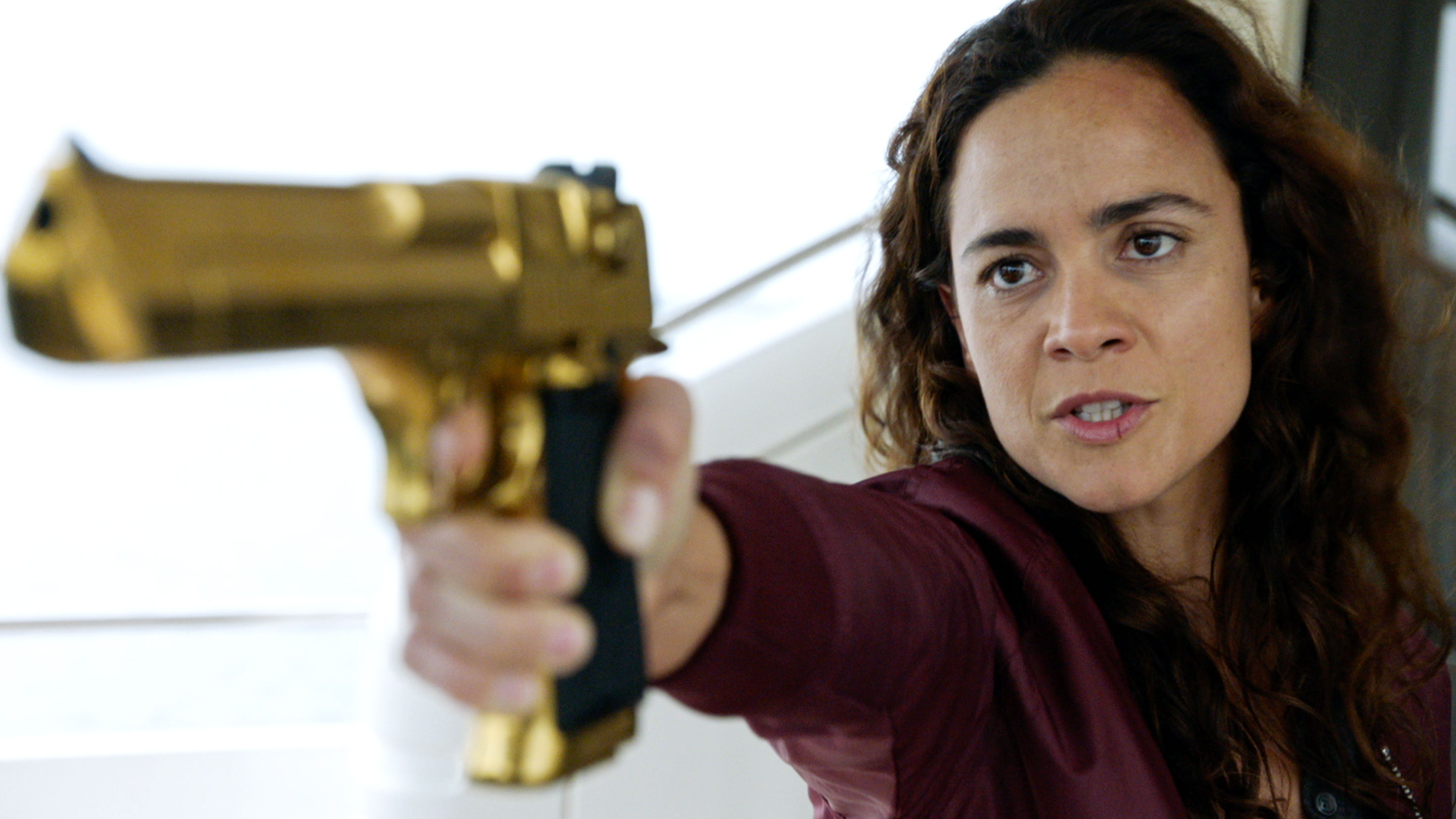 ★★★½
★★★½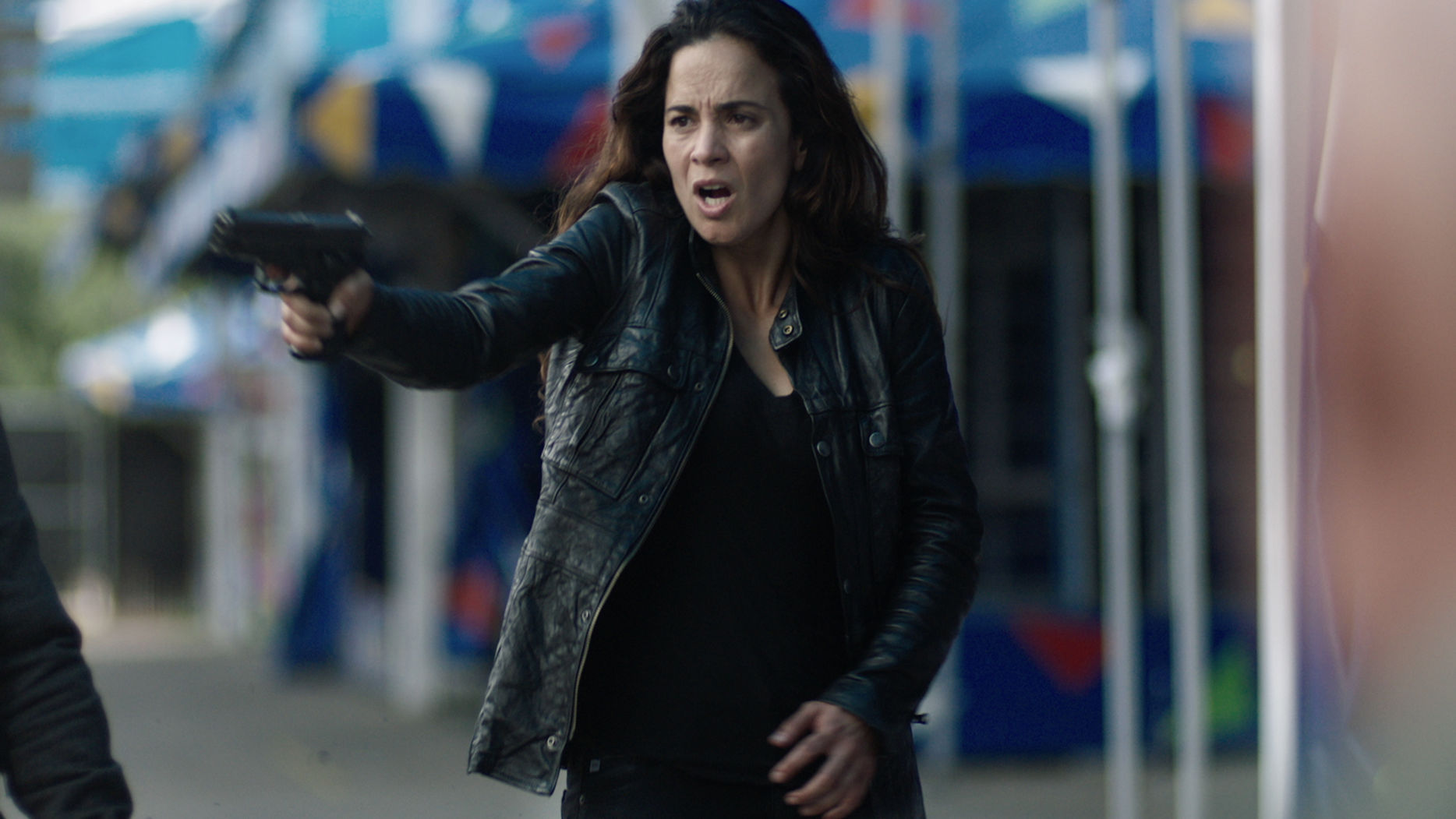
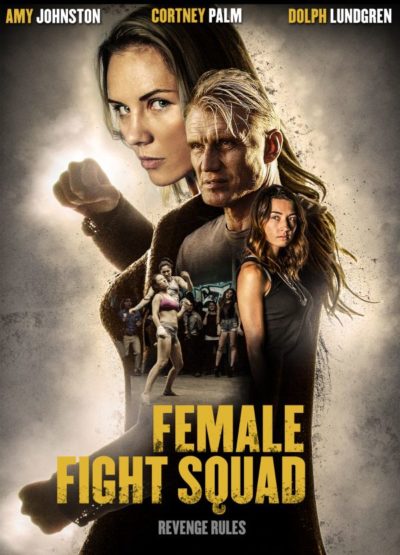 This was originally known as Female Fight Club. I presume the title was changed after a strongly-worded letter from David Fincher’s lawyers, perhaps to evoke thoughts of its star’s stunt work on Suicide Squad. It’s interesting, because Amy Johnston’s previous feature,
This was originally known as Female Fight Club. I presume the title was changed after a strongly-worded letter from David Fincher’s lawyers, perhaps to evoke thoughts of its star’s stunt work on Suicide Squad. It’s interesting, because Amy Johnston’s previous feature,  While the lack of resources is frequently and painfully obvious, I’m inclined to look kindly on this. My tolerance is due to the abiding love for our genre possessed by writer-director Krueger, shown in the influences, both obvious and subtle, on display here. From Faster Pussycat to Female Prisoner 701, he seems like the kind of man whose DVD collection reflects my own. Hell, despite being set in America, a character here even uses the greeting stance beloved of bad girls in pinky violence movies: knees bent, right arm outstretched, palm up. I can’t truly hate a film made by someone who knows what that is.
While the lack of resources is frequently and painfully obvious, I’m inclined to look kindly on this. My tolerance is due to the abiding love for our genre possessed by writer-director Krueger, shown in the influences, both obvious and subtle, on display here. From Faster Pussycat to Female Prisoner 701, he seems like the kind of man whose DVD collection reflects my own. Hell, despite being set in America, a character here even uses the greeting stance beloved of bad girls in pinky violence movies: knees bent, right arm outstretched, palm up. I can’t truly hate a film made by someone who knows what that is.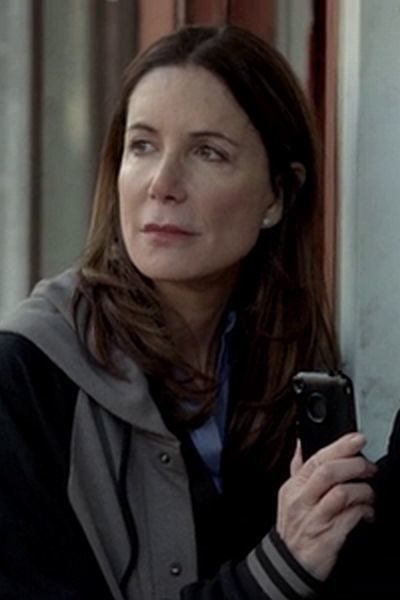 Ann Willis (Robbins) is a single mother, working as a waitress and trying to keep family together after the death of her husband from lung cancer. To help out, son David (Abrahamson) abandons his plans to attend college and gets a job in a local factory. But he falls in with some questionable company there and, lured by the prospect of easy money, starts dealing drugs for the local mobsters, run by Canarsie. Things go from bad to worse after his supposed “friend” Mike (Falahee) frames him for the disappearance of some product, and things end with David’s dead body floating in the river, having been beaten to death by his associates. The cops, and in particular, Detective Frank Hogan (Baldwin), investigate – but to be honest, aren’t particularly interested in one drug-dealer being killed.
Ann Willis (Robbins) is a single mother, working as a waitress and trying to keep family together after the death of her husband from lung cancer. To help out, son David (Abrahamson) abandons his plans to attend college and gets a job in a local factory. But he falls in with some questionable company there and, lured by the prospect of easy money, starts dealing drugs for the local mobsters, run by Canarsie. Things go from bad to worse after his supposed “friend” Mike (Falahee) frames him for the disappearance of some product, and things end with David’s dead body floating in the river, having been beaten to death by his associates. The cops, and in particular, Detective Frank Hogan (Baldwin), investigate – but to be honest, aren’t particularly interested in one drug-dealer being killed. Lance Charnes and I are Goodreads friends, having “met” (electronically) a few years ago through the Action Heroine Fans group. Some time ago, I bought a copy of his outstanding debut novel, Doha 12, and it got five stars from me. This new novel, the opener for a projected series, didn’t come to me as an official review copy –instead, Lance generously donated a print copy to the library where I work– but he knew I would read and review it, and knew my tastes well enough to be pretty sure I’d like it. Of course, we both understood that he might be wrong –but he wasn’t! For much of my reading experience, I expected to rate the book four stars –a denouement and conclusion that blew me to pieces and then knit me back together easily pushed it up to five stars.
Lance Charnes and I are Goodreads friends, having “met” (electronically) a few years ago through the Action Heroine Fans group. Some time ago, I bought a copy of his outstanding debut novel, Doha 12, and it got five stars from me. This new novel, the opener for a projected series, didn’t come to me as an official review copy –instead, Lance generously donated a print copy to the library where I work– but he knew I would read and review it, and knew my tastes well enough to be pretty sure I’d like it. Of course, we both understood that he might be wrong –but he wasn’t! For much of my reading experience, I expected to rate the book four stars –a denouement and conclusion that blew me to pieces and then knit me back together easily pushed it up to five stars.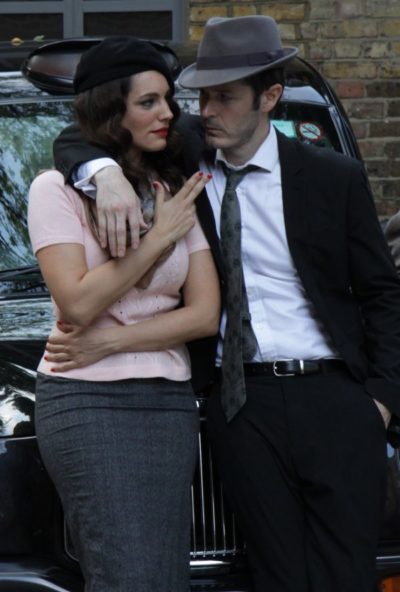 Kate’s (Brook) life has fallen apart: she has just been told the store she works at is closing because the owner is cashing in on a redevelopment offer; her boyfriend has dumped her; and Kate’s attempt at suicide by gas oven is doomed since she failed to pay the bill. What’s a girl to do? The answer is apparently, take inspiration from her heroine, Bonnie Parker. But rather than robbing banks, Kate teams up with her other disgruntled work colleagues, hatching a daring plan to copy the key to the store, seduce the safe combination out of the firm’s accountant, Mat (Williams) and plunder the ill-gotten gains.
Kate’s (Brook) life has fallen apart: she has just been told the store she works at is closing because the owner is cashing in on a redevelopment offer; her boyfriend has dumped her; and Kate’s attempt at suicide by gas oven is doomed since she failed to pay the bill. What’s a girl to do? The answer is apparently, take inspiration from her heroine, Bonnie Parker. But rather than robbing banks, Kate teams up with her other disgruntled work colleagues, hatching a daring plan to copy the key to the store, seduce the safe combination out of the firm’s accountant, Mat (Williams) and plunder the ill-gotten gains.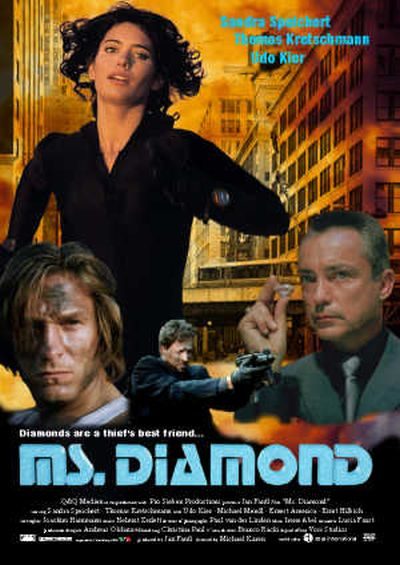 There’s an exhibition showcasing the first diamonds ever mined in Germany, dug up by the company belonging to Buhler (Kier). Keeping thing safe is the responsibility of security expert Tim (Kretschmann), who doesn’t realize that renowned jewel thief Lana (Speichert) has her eyes on the jewels. So they’re both in for a nasty surprise, because after Lana is caught by Tim in the process of stealing them, it turns out the diamonds are completely fake. Buhler gives her an ultimatum: Lana must find the real diamonds, or she’ll be handed over to the police, and to ensure she doesn’t just run off, tasks Tim with keeping an eye on her. It soon becomes clear, though, that there is more to the mystery than there appears initially, and someone is very keen to stop them from getting to the truth.
There’s an exhibition showcasing the first diamonds ever mined in Germany, dug up by the company belonging to Buhler (Kier). Keeping thing safe is the responsibility of security expert Tim (Kretschmann), who doesn’t realize that renowned jewel thief Lana (Speichert) has her eyes on the jewels. So they’re both in for a nasty surprise, because after Lana is caught by Tim in the process of stealing them, it turns out the diamonds are completely fake. Buhler gives her an ultimatum: Lana must find the real diamonds, or she’ll be handed over to the police, and to ensure she doesn’t just run off, tasks Tim with keeping an eye on her. It soon becomes clear, though, that there is more to the mystery than there appears initially, and someone is very keen to stop them from getting to the truth.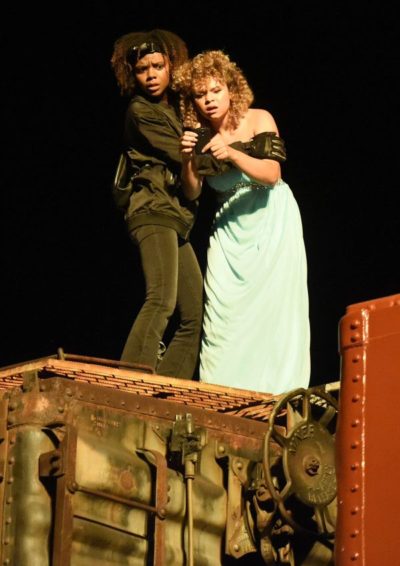 After their mother has a meltdown at her job and ends up in jail: teenage sisters Deidra (Murray) and Laney (Crow, somewhat infamous for her post-elimination meltdown on The X Factor) are left to fend for themselves. With household bills piling up – never mind trying to fund Mom’s bail, or even Deidra’s long dreamed-of college tuition – and Child Protective Services looming, things look bleak. But a visit to deadbeat Dad Chet (Sullivan, channeling David Spade), who works for a railway company, gives Deidra an idea. Hop aboard the freight trains that run by the back of their house, pop open a container to take some goods, and fence them on for cash. Things go surprisingly well, until a disgruntled railroad cop, Truman (Nelson), starts to close in on the pair, intent on rebuilding his reputation after an incident in Arizona.
After their mother has a meltdown at her job and ends up in jail: teenage sisters Deidra (Murray) and Laney (Crow, somewhat infamous for her post-elimination meltdown on The X Factor) are left to fend for themselves. With household bills piling up – never mind trying to fund Mom’s bail, or even Deidra’s long dreamed-of college tuition – and Child Protective Services looming, things look bleak. But a visit to deadbeat Dad Chet (Sullivan, channeling David Spade), who works for a railway company, gives Deidra an idea. Hop aboard the freight trains that run by the back of their house, pop open a container to take some goods, and fence them on for cash. Things go surprisingly well, until a disgruntled railroad cop, Truman (Nelson), starts to close in on the pair, intent on rebuilding his reputation after an incident in Arizona.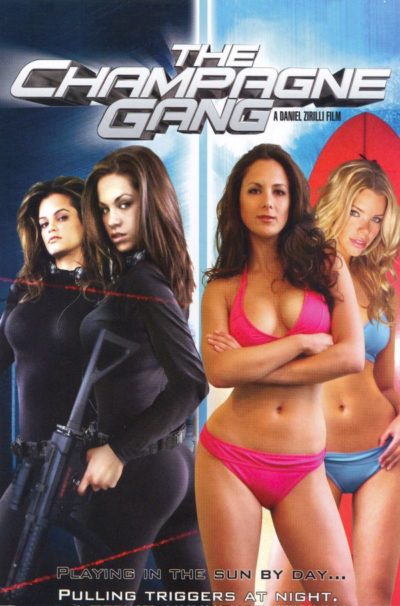 Under the leadership of Bliss (Toups), whose father is serving an extended stretch in jail, four young women stage a series of convenience-store burglaries in the San Diego area, before moving up to larger schemes. This brings them to the attention of local crime-boss, Cal Wertlieb, who makes them an offer they can’t refuse. He’ll train them to carry out more lucrative jobs, by cracking safes, which will give them access to cash and other easily fungible loot, in exchange for a cut of the proceeds – and their absolute silence in the event of them ever being caught by the authorities.
Under the leadership of Bliss (Toups), whose father is serving an extended stretch in jail, four young women stage a series of convenience-store burglaries in the San Diego area, before moving up to larger schemes. This brings them to the attention of local crime-boss, Cal Wertlieb, who makes them an offer they can’t refuse. He’ll train them to carry out more lucrative jobs, by cracking safes, which will give them access to cash and other easily fungible loot, in exchange for a cut of the proceeds – and their absolute silence in the event of them ever being caught by the authorities.